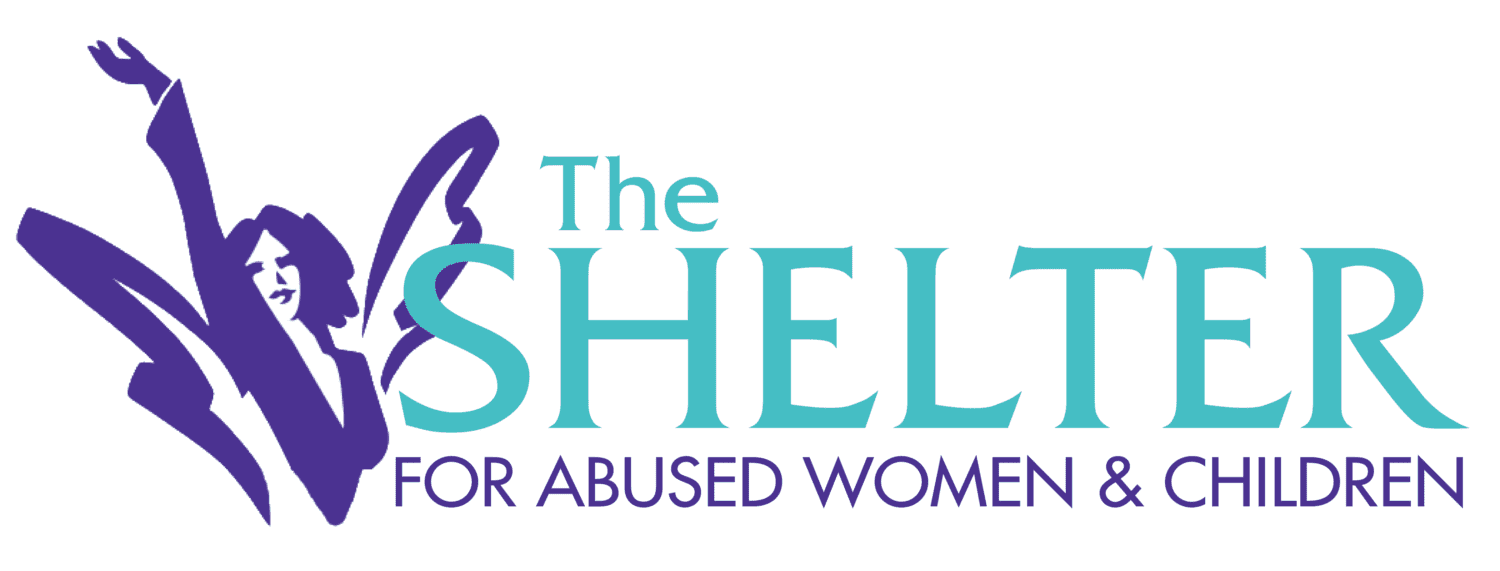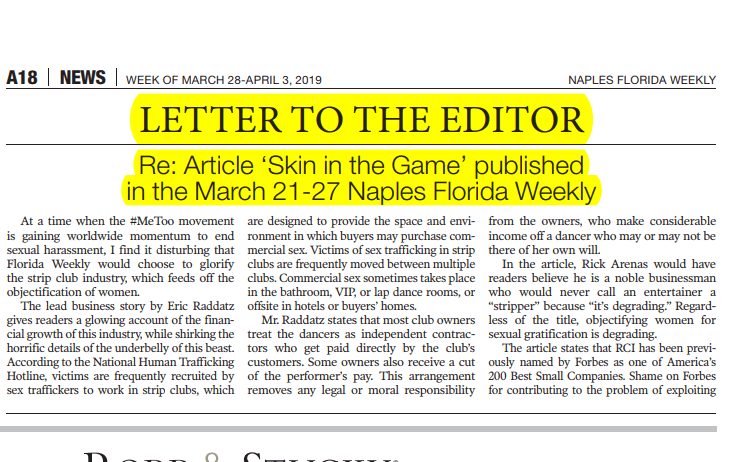Linda Oberhaus speaks out on Florida Weekly business story
Business Feature: Skin in the Game
Florida Weekly, March 21, 2019 edition
By Eric Raddatz
When it comes to the adult entertainment industry, business is strictly business … for most.
For those who see adult entertainment from a strictly business point of view, not much is different from any other say, ordinary business. The folks who go to such establishments are “the same who you see at restaurants, at concerts, at the movies, at the coffee shops,” says Rick Arenas, investor in Scarlett’s Cabaret in Fort Myers. “They just like to go out for adult entertainment too. They’re the same people. It’s no different than any other business, really.”
And business is going very well for him in this portion of his investment company, he says. This business is business to him. He says his club operates with a respect for the entertainers. “I will never call an entertainer a ‘stripper.’ It’s degrading, although that is what they were called 30-40 years ago.”
He encourages couples to visit his club, offers football parties and WWF specials — downplaying the adult entertainment part. “It’s different than it was when I was younger.”
A number of clubs seek to promote their establishments as a good place for happy hour, for girls’ night out, or just a fun place to watch the game.
Many say business is up and some have grown their enterprises into lucrative investments.
RCI Hospitality Holdings Inc. or “RICK” as it is traded on Nasdaq, for example, owns and operates a dozen or so upscale adult entertainment clubs including Tootsie’s Cabaret in Miami and Scarlett’s Cabaret strip club in Pembroke Park, which it reportedly was purchased for $25 million in 2017. In January it reported first quarter total sales up 6.5 percent with total club and restaurant sales at $43.4 million compared to $40.8 million in the same quarter of last year.
RCI has been previously named by Forbes as one of America’s 200 Best Small Companies. Business, as far as business goes, appears to be lucrative right now. “Fiscal 2019 has started off well in what is seasonally our strongest period with record first quarter club and restaurant sales, featuring solid same-store growth in nightclubs,” Eric Langan, president and CEO said at a public meeting last month.
And business is not just a lucrative one for investors, it seems. It is also quite profitable for those working in the clubs. “If you are bartending at my club you’re making at least 20 percent more than as a server at any other bar, restaurant or regular club in town,” Mr. Arenas said.
This seems borne out by those who have worked in both environments in the past. “Yes, if we were working the late shifts, comparable to both establishments we would definitely make more at the adult clubs,” says Silvie Krizova, a popular server who works exclusively at a restaurant in downtown Fort Myers.
Profits and higher tips come from pricing on beverages, for example, where it is normal to pay a lot more for VIP bottle packages. One website lists prices for being served in its champagne room of “$325 for a premium bottle and four guests” to “$975 for three bottles and up to 12 guests.” Tips rise with the cost of the drinks. The dancers, who will generally make more than the bartenders, can charge in the range of $250 for a half-hour “experience,” or $25 for a lap dance, and will generally offer a percentage to the house and tip those who assist them with the service.
The dynamic of how each club conducts business with its dancers seems different from club to club, however most treat the dancers as independent contractors who get paid directly by the clients visiting. Some dancers pay the club owners, or house, and DJ a percentage of that.
Through it all, and in a sweep of litigation over the last few years, many dancers sued strip club owners across Florida and nationwide, demanding the benefits offered to actual employees. Many won in class-action style, claiming they were more than just independent contractors and were not paid minimum wage, often forced to pay the house at exaggerated levels, and without basic benefits. Florida clubs paid out millions to settle these suits.
Joe Redner notes that his dancers are all self-employed. He just charges people to come in. He notes that he has been arrested over 150 times, mostly in the early years establishing the industry’s legality. He runs the Mons Venus strip club in Tampa and has been in the industry since the 1970s when go-go establishments were the rage.
“I’ve found a way to monetize the fight, though,” Mr. Redner says. “I’ve parlayed the Mons Venus into a $60 million operation including property expansion, beer manufacturing and the marijuana business.” Adult entertainment has indeed opened doors in other business he would never have had the chance to get in, he says. The arrests have subsided, as most were of lewd conduct and through the years have gotten thrown out. “We have a first amendment right and our constitution and the Supreme Court has protected us in the business.”
Ask him what has changed the climate of the industry and he says it was conclusively one thing. “The internet.” The easy access to free content online delivered a hit to the industry.
Dave Johnson, who runs Teasers in Key West, agrees that the internet, and in 2017 Hurricane Irma, have adversely affected businesses across the board.
“(The year) 2019 we feel will be better than 2018 or 2017 when Irma hit us,” Mr. Johnson says. The hurricane closed his establishment for 10 days. He says business is better than ever now, although his clientele has changed a little.
“Sure, we’ve had more couples than we’ve ever had before. Still, in the end it’s all about selling drinks. Key West used to be very seasonal, but what is happening now is that we have become much more gentrified with hotel rates high all year round. I have millionaires come in on a regular basis.”
“Anyway, I don’t think I could ever go back to the 40-hour work week,” Mr. Johnson admits.
Editorial response: Skin in the Game
Florida Weekly, March 28, 2019 Edition
By Linda Oberhaus
Dear Editor:
Re: Article “Skin in the Game” published in the March 21-27 Naples Florida Weekly.
At a time when the #MeToo movement is gaining worldwide momentum to end sexual harassment, I find it appalling that Florida Weekly would choose to glorify the strip club industry, which feeds off the objectification of women.
The lead business story by Eric Raddatz gives readers a glowing account of the financial growth of this industry, while shirking the horrific details of the underbelly of this beast. According to the National Human Trafficking Hotline, victims are frequently recruited by sex traffickers to work in strip clubs, which are designed to provide the space and environment in which buyers may purchase commercial sex. Victims of sex trafficking in strip clubs are frequently moved between multiple clubs. Commercial sex sometimes takes place in the bathroom, VIP, or lap dance rooms, or offsite in hotels or buyer’s homes.
Mr. Raddatz states that most club owners treat the dancers as independent contractors who get paid directly by the club’s customers. Some owners also receive a cut of the performer’s pay. This arrangement removes any legal or moral responsibility from the owners, who make considerable income off a dancer who may or may not be there of her own free will.
In the article, Rick Arenas would have readers believe he is a noble businessman who would never call an entertainer a ‘stripper’ because “it’s degrading.” Regardless of the title, objectifying women for sexual gratification is degrading.
The article states that RCI has been previously named by Forbes as one of America’s 200 Best Small Companies. Shame on Forbes for contributing to the problem of exploiting women and girls in our county by naming a strip club one of America’s 200 Best Small Companies. Forbes is clearly part of the problem.
In the article, Joe Redner, operator of Mons Venus strip club in Tampa, points to his first amendment right that protects his business. Perhaps we could head off the First Amendment with the Fifth Amendment, where it discusses the fact that citizens of the United States not be deprived of life, liberty, or property without due process of law.
Redner says his industry has been adversely impacted by the internet, due to easy access to free content online. While the internet has created a hit to his industry, women and girls are now being sold by traffickers on line as much, if not more, than they are out of strip clubs.
In the article, Dave Johnson, who runs Teasers in Key West, is quoted as saying, “in the end it’s all about selling drinks.” But it’s not about selling drinks, is it Mr. Johnson? It’s about selling sex. It’s about the objectification of women, and by doing so, these clubs perpetuate violence against women and girls.
Johnson’s final quote, “I have millionaires come in on a regular basis,” provides readers with a chilling truth, most recently supported by the arrest of Patriots owner Robert Kraft. Traffickers go where the wealthy white men are.
In December 2017, Florida Weekly raised considerable public awareness with a cover story on the shocking reality of human trafficking. This week’s story glorifying strip clubs takes the public three steps back. While they may be sound financial investments, strip clubs are a breeding ground for human trafficking. Please choose your stories with more consideration.
Linda Oberhaus
CEO, The Shelter for Abused Women & Children







